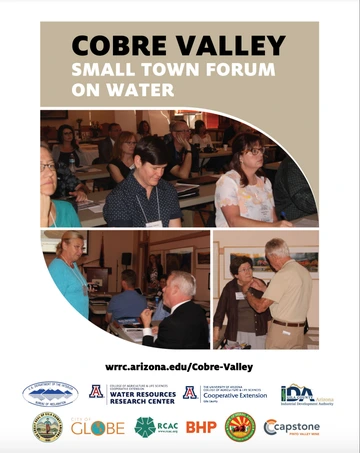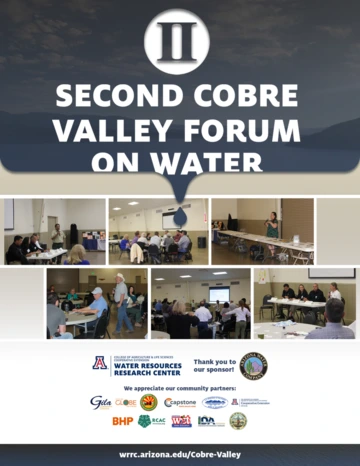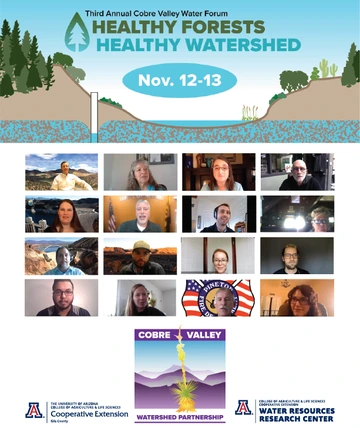The Cobre Valley is only about 200 square miles, but despite the size, it is home to multiple competing water uses. Water scarcity and upcoming legal determinations are making it more critical than ever for all community water users to agree on the status of water resources in the Valley and establish priorities for their management. To this end, the WRRC has co-convened four community forums with local and regional partners since 2018.
Newly Released! Forum 4 Video Series is Available
View all video recordings from After the Fire meeting on October 29-30, 2021: https://extension.arizona.edu/after-fire-video-series
FORUM 1

On September 6, 2018 more than 50 people gathered in Miami, Arizona to lend voice to the Cobre Valley Small Town Forum on Water, a meeting to facilitate discussion about water resources management among elected officials, utility and planning staff, natural resource experts, and other interested water users. The quality and depth of ideas around regional water resources on September 6th laid excellent groundwork for our next steps. From the informative presentations in the morning to the afternoon break-out discussions, we were presented with many innovations and benefits of collaboration for sustainable water resources. In coordination with the US Bureau of Reclamation, Cobre Valley Watershed Partnership, and other community partners, we will pursue research and action planning around the seven agreed upon priorities within the four categories of: system efficiency/conservation, economy/development, recreation/environment, and water awareness/education. Proposed actions were defined and assigned priorities based on focused discussions and participant voting. These priorities were further evaluated through a survey that went out to a broader audience in October 2018, while the other ideas from group discussions were considered for incorporation into a Water Bulletin accompanied by water supply and demand data. The top seven priorities from the Forum, by category, included:
System Efficiency/Conservation
1) Develop a comprehensive water budget 2) Expand management practices of land to better utilize stormwater flows and quality
Economy/Development
3) Set framework for private-public partnerships for longterm water supply resilience; 4) Explore the feasibility of matching water quality to use
Recreation/Environment
5) Ecological stewardship to preserve, enhance, and manage natural resources for resilience, adaptation, and restoration/transformation 6) Combine and share both knowledge and resources under guiding philosophies for collective impact
Water Awareness
7) Education of the public and decision-makers to increase awareness and motivate action
Presentations from the Small Town Forum shared baseline information, lessons, and successes of local water resources management.
See the full summary report HERE.
Forum 1 Presentations
The morning sessions included 12 presentations and provided important baseline information about Cobre Valley water resources with different perspectives on local challenges, successess, and opportunities for collaboration.
- Brian Conway (Arizona Department of Water Resources) - Water Resources in the Cobre Valley Watershed
- Joel Rose, Jennifer Wendel, and Bethany Sullivan (University of Arizona James E. Rogers College of Law) - Overview of the Arizona General Stream Adjudication
- Charles Ester III (Salt River Project) - SRP Perspective: Cobre Valley Small Town Forum
- Bill Garfield (Arizona Water Company) - Cobre Valley Water
- Sandy Palmer (Industrial Development Authority of Gila County) - WaterSMART Cooperative Watershed Partnership for Cobre Valley
- Mayor Darryl Dalley (Town of Miami) - Update on Miami's Wastewater Infrastructure Updates
- Myron Smith (KGHMI/Carlota Copper Company-Carlota Mine) - Watershed Issues
- Tim Ralston (Capstone Inc./Pinto Valley Mine) - Water: Yesterday's Successes and Tomorrow's Challenges
FORUM 2

On April 9, 2019 the Second Cobre Valley Forum brought together around 70 people to look at water in the region from different angles and perspectives. One of the major goals of the day was to illustrate the importance of secure and clean water supplies to our everyday lives, focusing on: current water supply and demand estimates; on-the-ground work to increase the visibility of water-dependent natural resources and promote environmental stewardship in the area; economic development in consideration of the local environment; and public awareness and education about water. The forum continued conversations begun in September 2018 at the First Cobre Valley Forum on Water among stakeholders and leaders from government, industry, not-for-profit sectors and community activists on watershed issues. Between these two forums, the WRRC worked with community partners to move forward with goals defined in the first forum. On April 9, guest speakers presented the results of that work and other pertinent topics, including a Cobre Valley water budget, Pinal Creek Trail pilot site, and innovative approaches to water education and awareness. Gila County Cooperative Extension Agent, Chris Jones, shared scientific factors impacting the growth and survival of cottonwood trees and led an interactive Q&A. UA architecture and planning students shared the results of a semester-long project developing options and plans for sites in Cobre Valley and the San Carlos Apache Reservation, and the UA's "Project Harvest" shared first-year data on the quality of locally harvested rainwater. Kerry Schwartz brought it together with ideas of how to communicate these critical issues to children and adults alike. Finally, a panel of stakeholders answered questions about challenges, aspirations, and potential solutions. These presentations, discussions, and the comments/questions received from the audience will help the University of Arizona, as well as other organizations, understand what research and coordination could be directed to Cobre Valley to support healthy communities and watershed. See the full forum summary report HERE.
Forum 2 Presentations
For the second water forum, we had presentations related to water supply and demand, on-the-ground work, and water education. The University of Arizona College of Architecture, Planning, and Landscape Architecture also presented a semester-long capstone project focused on a economic development through an environmental lens. Check out the full report: Cobre Valley CHEER: 5-4-3 Framework
- Bethany Cheney (Gila County Department of Public Health) - Pinal Creek Trail Demonstration Site
- Christopher Jones (Gila County Cooperative Extension) - Future of Cottonwoods in Cobre Valley
- Anthony Aceves, Holly Barton, Jhentille Cargill, Chase Cushing, Emma James, & Monica Landgrave-Serrano (UA College of Architecture, Planning, and Landscape Architecture) - Cobre Valley CHEER
- Mónica Ramírez-Andreotta (UA Department of Soil, Water and Environmental Science/ College of Public Health’s Division of Community, Environment & Policy) - Project Harvest: A Co-Created Citizen Science Rainwater Harvesting Program in Rural and Urban Arizona Community
- Kerry Schwartz (Arizona Project WET, UA Department of Soil, Water and Environmental Science) - How We Develop Lifelong Skills and Systems Thinking
See photos from the event HERE.
Click HERE to view the forum agenda.
FORUM 3

The Third Annual Cobre Valley Water Forum went virtual in 2020 with the theme: Healthy Forests, Healthy Watershed. On November 12-13, 2020, over 60 people tuned in to learn about how healthy forests and uplands support the overall health of the watershed. Over a dozen speakers shared information and specific recommendations to help us evaluate our role in the changing reality of forests, fire, and watershed health. As a virtual Forum, participants had the opportunity to provide real-time feedback throughout the two-day event, which was recorded and is available to review along with other vital recommendations. View the summary report HERE.
If you have questions about the forums or next steps, please email Ashley Hullinger at hullinger@email.arizona.edu.

